
views
Talking to a Teacher or Counselor

Find a trusted adult as soon as possible. If you are being abused, or suspect someone you know is being abused, it can be hard to know where to turn. Look for someone you personally trust who is in a position of authority, such as a teacher or a counselor. If you're religious, you might also talk to your religious leader or someone in a position of authority in your church or temple, such as a religious teacher or youth group leader.Don't Give Up! If the first person you report the abuse to doesn't seem to care, doesn't take you seriously, or shrugs it off, find someone else. Keep telling people until someone takes you seriously.
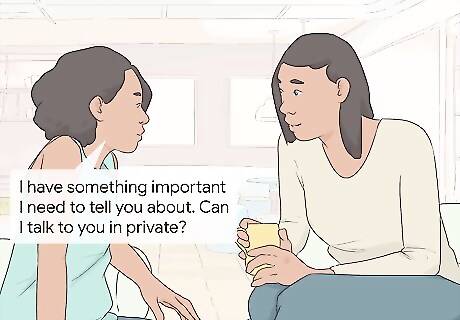
Ask to speak to the person in private. It's best if you have this conversation in a quiet area without distractions where you don't have to worry about being overheard. Let the person know that you want to speak to them in confidence. For example, you might say "I have something important I need to tell you about. Can I talk to you in private?"Tip: Even though the person may speak to you in confidence, some people, including teachers, counselors, and some religious leaders, are required by law to report abuse to child protective services or the local police department. They're not violating your trust and confidence by doing this – they're simply looking out for the safety of you or anyone else who is being abused.

Describe the abuse to the extent you feel comfortable. Talking about abuse can be frightening or even embarrassing, particularly if you need to talk about sexual abuse. Just take it slow, and tell the person what happened using words that you're comfortable using. It can be just as difficult if you're talking about someone you know who you worry is being abused. You're concerned for their safety, but you can't be sure what's going on. Just tell the adult what you know, or what you've seen that leads you to believe the person is being abused. Try to stick to the facts as much as possible. At the same time, don't worry if you have a hard time controlling your emotions. It can be difficult not to break down, especially if this is the first time you've told anybody. However, the act of telling can be a relief and will take a tremendous weight off your shoulders.
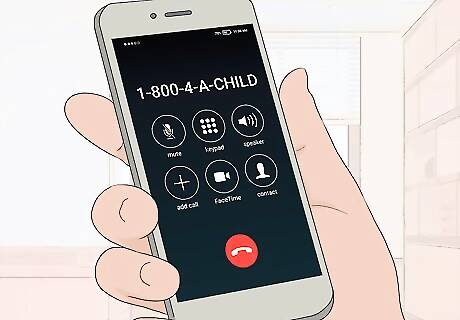
Call a hotline if you're worried about upsetting an adult. The national child abuse hotline, 1-800-4-A-CHILD, is available 24 hours a day, 7 days a week. You can talk to one of the volunteers and they will help connect you to the resources you need to report the abuse. The hotline can also be helpful if you want to remain anonymous. For example, you might suspect a friend is being abused but don't want them to know that you reported the possible abuse. The volunteer will ask you questions. Answer them as completely and honestly as you can. Remember that it's not a test. It's okay if you don't know the answer to some of the questions, or if you don't want to answer a question – just say so.Tip: Many states, as well as nonprofit organizations, also have toll-free hotlines that are available 24/7.
Calling Child Protective Services
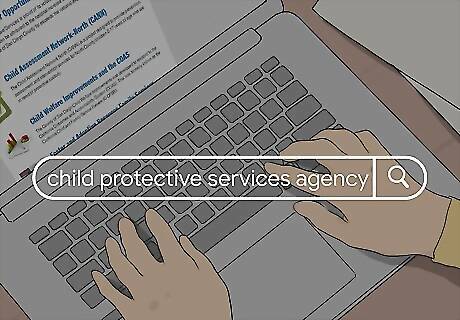
Look up the child protective services agency in your state. Each state has its own child protective services agency that investigates reports of abuse. In some states, the agency may have a different name, such as the "Department of Social Services" or the "Department of Family and Protective Services." Each of these agencies has a website with information on how to contact them and the services they provide. The easiest way to find information for your state is to do an online search for "child protective services" followed by the name of your state. Check the address of any links carefully to make sure they're government sites. The URL for a government site will usually end in ".gov," although some states have different endings. For example, Florida's official state sites end in "state.fl.us."Tip: Child protective services agencies typically handle domestic abuse. If you want to report abuse that is happening outside the home, such as at a school, church, or after school program, call your local police department.
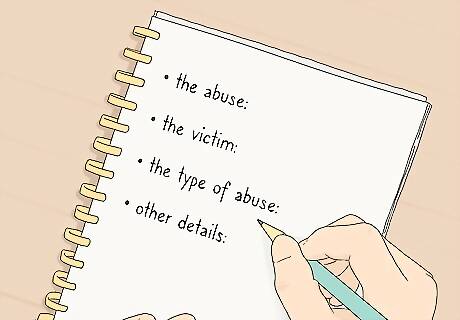
Gather information about the abuse. Before you call to report the abuse, take a moment to write down everything you know about the abuse that's taking place, the victim, the type of abuse, and other details. Once you're on the phone, you may have a hard time remembering various details. It's a good idea to first sit someplace quiet and take a moment to write everything down.
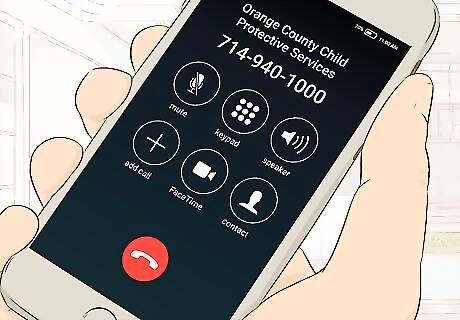
Call your state's child protective services agency to report the abuse. Child protective services agencies typically have a toll-free number you can call. The number may be available 24/7, although you may only be able to talk to a live operator during regular business hours. You'll likely have to choose an option from a menu to register that you want to report abuse. Provide as much detail as you can. If the victim is someone other than yourself, state the victim's name, age, birthday (if you know it), and where they live. If the victim has any medical problems or disabilities, include that information as well. If you are not the victim, explain why you believe the person is being abused. For example, you may have noticed changes in their behavior or bruises on their body.

Talk to a social worker in person. After you've called child protective services, a social worker will likely want to interview you in person – particularly if you are the victim of the abuse. While this can be an intimidating experience, remember that the social worker wants to help and is looking after the best interests of the victim of the abuse. The social worker will go over your report and ask you questions about it. If you reported the abuse of someone else, the social worker may want to know your relationship to that person. The social worker may ask you questions that you don't know how to answer or don't want to answer. It's okay to say that – you don't have to make something up. However, if you say you don't want to answer a question, the social worker will likely ask you why.

Cooperate with the agency's investigation. The social worker will investigate the home life of the victim of the abuse to determine what's going on. They will likely interview parents, other family members, siblings, and neighbors. In the case of a child, if the social worker believes the child's safety is at risk, the child may be removed from the home. Even if you're not the victim of the abuse, keep in touch with the social worker during the course of the investigation. If you hear anything new or find out any additional information, give them a call and let them know.
Filing a Police Report
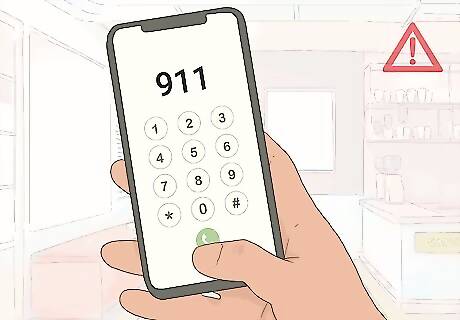
Call 911 only if someone is in immediate physical danger. Never call 911 unless there is an emergency situation currently in progress. If the abuse is currently occurring, or if you have reason to believe it is imminent, then calling 911 may be warranted. For example, you have a friend who has told you that her father abuses her when he comes home after drinking with his friends. You're on the phone with your friend when she abruptly says she has to go, her dad just came home from a night out drinking. You can hear him yelling in the background. It is probably appropriate to call 911 in this situation.

Use the non-emergency number to report a pattern of abuse or past abuse. You can look up the non-emergency number for your local police department online. When you call that number, explain to the dispatcher that you want to report abuse. They typically will ask for your name and location before taking the rest of your report. If you are the victim of the abuse, the dispatcher may ask you if you are in a safe place or if you feel safe. If you don't, they may give you some information about places you can go where you will feel safe and protected. After you provide your information, dispatch typically will send a uniformed officer out to you to take your full report. If you would rather the officer not come to you, it may be possible for you to give a full report in a different location, or stop by the station.
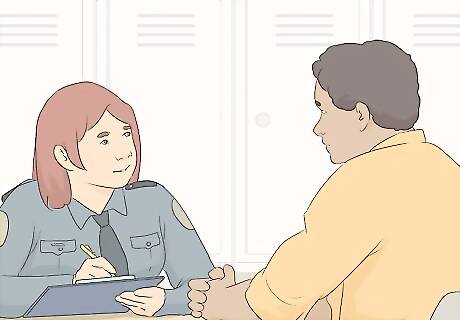
Tell the police officer as much as you can about the abuse. When you give a police report, the police officer typically will start by asking you to tell them what happened, or what has been going on, in your own words. Provide as much detail as you can, including the dates, times, and locations of each instance of abuse. Try to stick to the facts as much as possible. This can be difficult, especially if you are the victim. Trauma can cause you to forget things, so it's okay if the whole thing seems like a blur, or if you can't remember details that you think you should be able to remember. Bring with you any items or other evidence you may have of the abuse, such as photos of bruises or broken furniture.
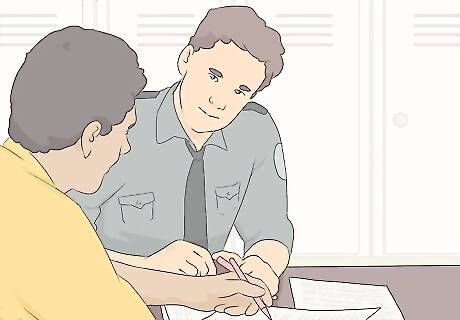
Answer any questions the officer may have for you. After you've told your story, the officer will likely have follow-up questions for you to attempt to get more detail about the abusive acts and the perpetrator of that abuse. Tell the officer as much as you know. If you don't know or don't remember something, it's okay to say so. If you don't know the answer to something, but you could easily figure it out, let them know that you will find out the answer to that question and get back to them.
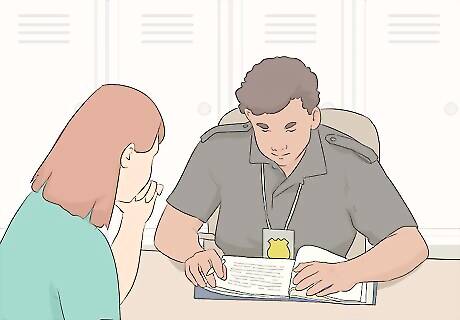
Remain available for follow-up. The police officer will give you a written copy of your police report. It has a number at the top that you can use if you have any additional information that you learn later on. The officer also may contact you with additional questions. Don't call the officer to ask how the investigation is going. Law enforcement officers typically can't give you updates on the status of an ongoing investigation. If they need more information from you, they'll contact you.Tip: If the abuser is arrested and charged with a crime, you may be contacted by a prosecutor. They may ask you to testify at trial. You don't have to do this if you don't want to, or if it makes you scared or uncomfortable. It's entirely your decision.

















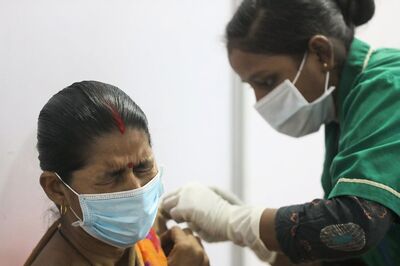


Comments
0 comment